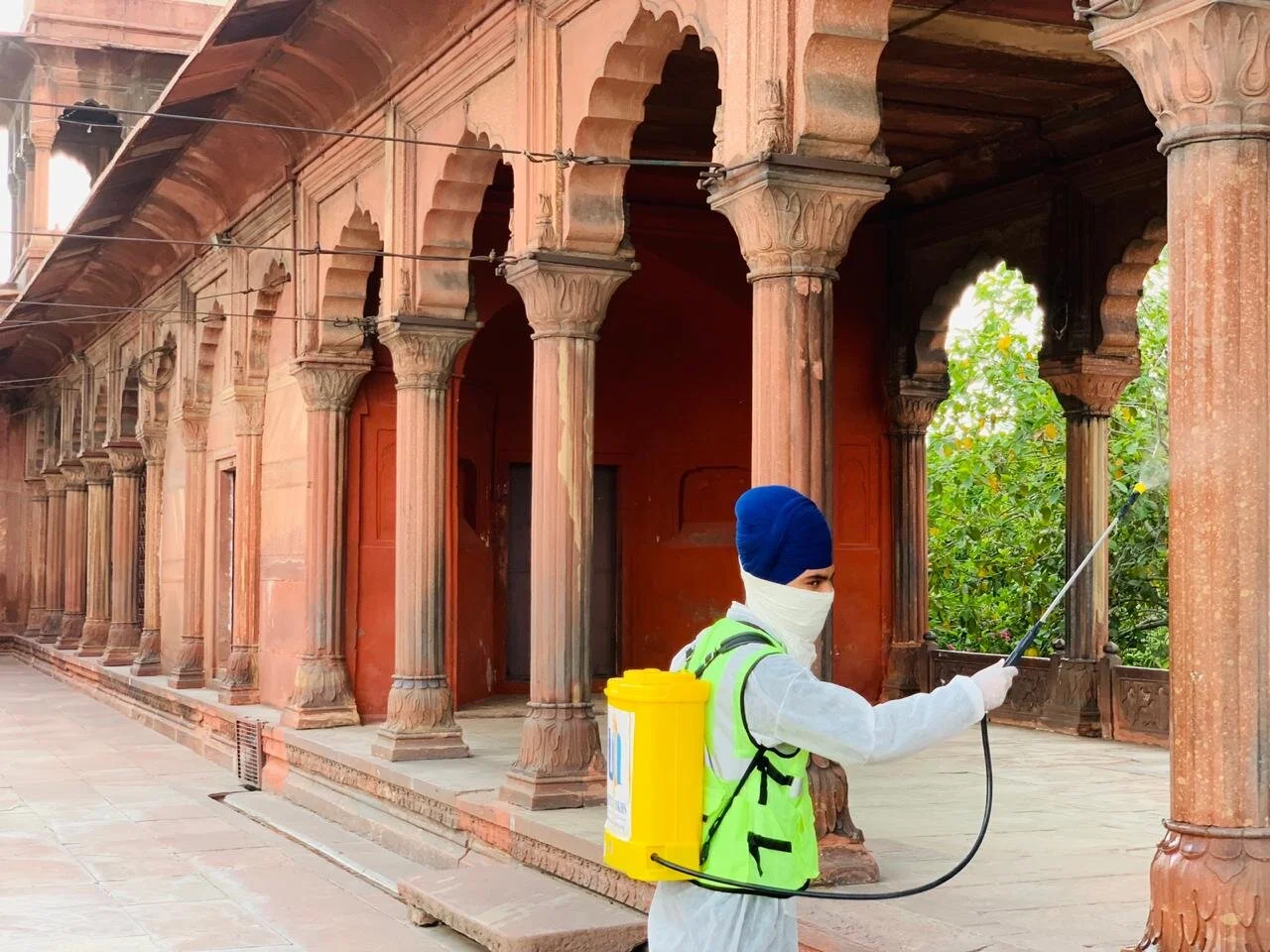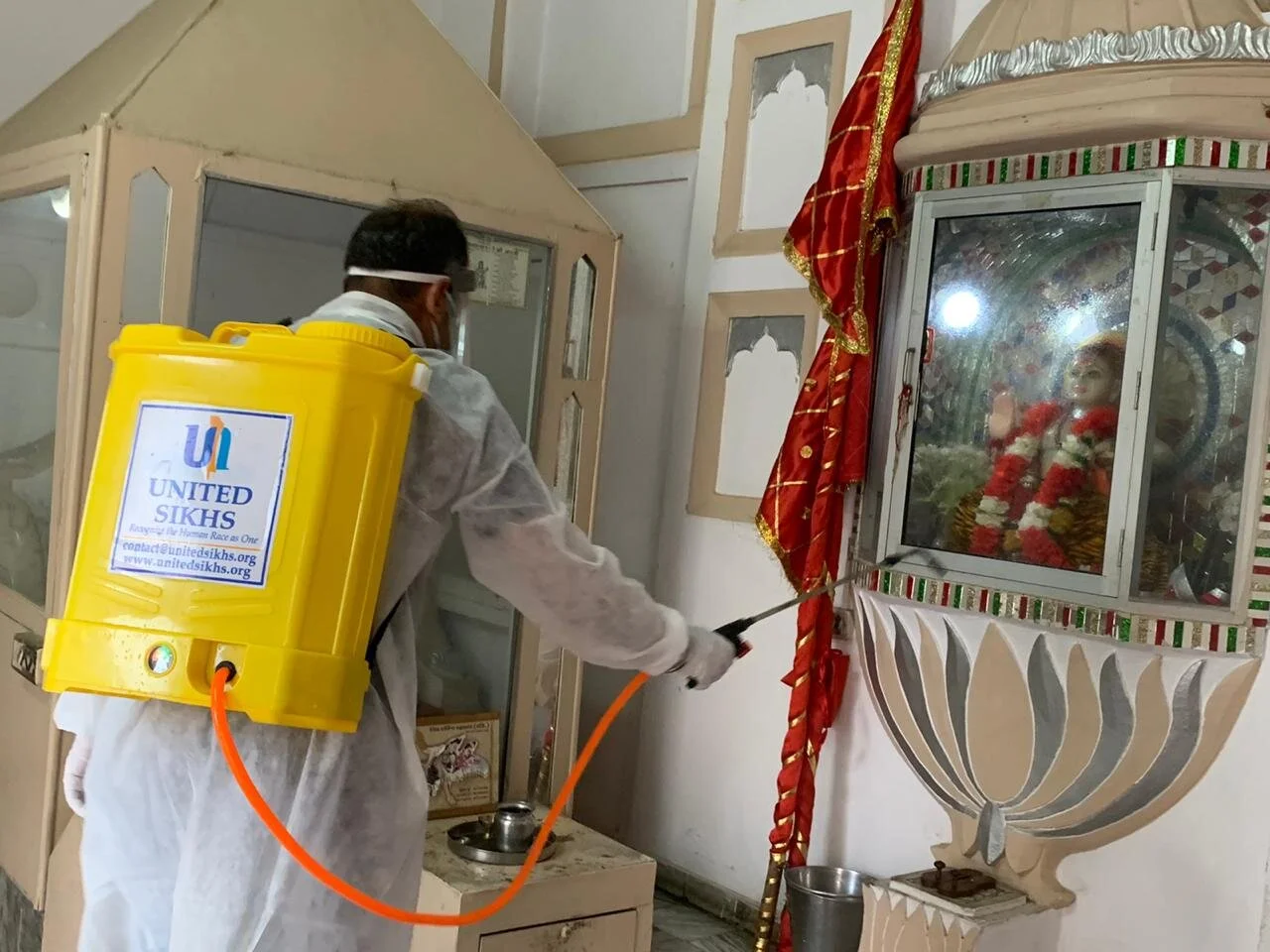Indian Sikhs sanitizing over 500 temples, mosques and churches for reopening
A volunteer with United Sikhs sanitizes a mosque’s interior. Photo courtesy of United Sikhs.
NEW DELHI — When Jasmeet Singh and Mufti Tahir Hussain met in Delhi in April in the middle of the growing coronavirus pandemic, little did the two longtime friends realize that a casual conversation would lay the foundation of a major act of harmony.
Singh — who heads United Sikhs, a charity working to help people out of poverty, hunger, disease, illiteracy and crisis after natural disasters in 11 countries — suggested to Tahir, an imam, that his volunteers could sanitize one of the oldest and largest mosques in India, the Jama Masjid in Delhi.
Volunteers of United Sikhs stand in front of the Jama Masjid in Delhi. Photo courtesy of United Sikhs.
India has been gradually relaxing its nationwide lockdown since May 4, allowing some transportation like taxis again, and opening private offices with limited capacities. Although states have varying guidelines, further phases of relaxed restrictions are planned for June, with religious sites like temples and mosques allowed to reopen in much of the country with limited capacity starting June 8.
Singh’s idea sounded great to Tahir. The shahi imam, or head cleric, of the Jama Masjid welcomed the help to sanitize the mosque during Ramadan, a period of fasting for Muslims that ended May 25. The mosque has been closed for congregational prayers since mid-March.
A volunteer with United Sikhs sanitizes the inside of the Jama Masjid courtyard. Photo courtesy of United Sikhs.
Sikh volunteers, wearing face masks and other protective kits, swooped inside the mosque and sanitized it in just two hours. Moved by the generosity of the Sikhs, local Muslims also joined the Sikh volunteers to cleanse their mosque.
Since the start of the coronavirus pandemic in India, United Sikhs has regularly sanitized more than 500 religious places in 10 states across the country, starting with the Golden Temple in Punjab, the holiest shrine in Sikhism. While these religious sites have been closed to the public, many clerics still visit them to worship and maintain the idols or property.
A volunteer with United Sikhs sanitizes a Hindu idol casing inside a temple. Photo courtesy of United Sikhs.
“When the coronavirus pandemic started, we provided hand sanitizers and personal utility kits and vitamin capsules to people in the quarantine centers and PPE kits to doctors,” Singh said. “Later we focused on sanitizing religious places. We thought it is important to do that to keep the religious places clean and open for the devotees.”
The effort intensified after reports that the government plans to allow conditional opening of religious places across the country.
“We have requested United Sikhs to conduct similar drives in other mosques and seminaries,” Tahir said. “We want to reciprocate this act of kindness and generosity.”
Living up to its motto that the “human race is one,” United Sikhs has in the past worked to bring relief to people affected by natural calamities like floods in the Indian states of West Bengal and Kerala.
“We believe in serving people irrespective of faith, gender, caste and creed,” Singh said.
The United Sikhs stand in front of Delhi’s biggest and oldest Catholic church, Sacred Heart Cathedral, after sanitizing the sanctuary. Photo courtesy of United Sikhs.
The act of compassion and kindness could not have come at a more appropriate time, when India is grappling with increased mob lynching of Muslims and attacks against Christians, and Delhi experienced India’s worst religious violence in decades in February, in which 53 people were killed, most of them Muslims. There are frequent reports of threats and intimidation to minorities, particularly Muslims, by right-wing Hindu extremist groups.
Tensions between different religious communities have escalated since Prime Minister Narendra Modi’s reelection to a second term in 2019, after his Bharatiya Janata Party (BJP) pushed for the Citizenship Amendment Act (CAA) and the National Registry of Citizens (NRC). The two laws — one passed and one still in discussion — are seen as an attempt to target minorities, particularly Muslims.
“During the Delhi riots, we brought essentials for Muslims and Hindu families who were affected,” Singh said. “The purpose was to keep humanity above everything else. Ninety-nine percent, we are getting positive response. We intend to target that the one percent of angry people, kindle love in their hearts.”
The rapid spread of COVID-19 has further exposed the growing friction. Migrant laborers who live off meager daily wages were forced to walk hundreds of kilometers after Modi hastily announced a countrywide lockdown in March. Then many Indian media outlets blamed the spread of the coronavirus in India on a mosque gathering in Delhi held in March.
Tahir and Singh say their efforts are precisely to counter the narrative that is projecting discord rather than helping to build bridges between different communities.
“Media should highlight such positive news that will create an atmosphere of love, but mostly they are projecting negative news and creating discord among different communities that has caused a lot of anger and fear,” Tahir said.
Their message is clear: live together, love each other and be friends in kindness.
Zaffar Iqbal is a journalist based in Kashmir India. He has reported for 18 years on armed encounters, environmental issues, crime, politics, culture and human rights. He’s formerly the bureau chief of Jammu and Kashmir for NDTV.





